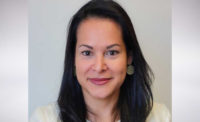Title: Emma Knight, Project Manager, McKinstry
Age: 29
Educational Experience: Bachelor’s degree in mechanical engineering, Oregon State University
Professional Credentials/Accreditations: Engineer in training (EIT)
What does your day-to-day job entail?
I manage mechanical and plumbing scope on new construction job sites. My day-to-day tasks involve supporting my union craft leads for each trade. My team’s main goals are to support the field and remove as many constraints as possible so they can install ductwork and piping safely and effectively. I also manage the project’s financials and report monthly to management.
What caused you to/when did you fall in love with engineering?
When I attended high school, my school required a technology credit to graduate, so I took an engineering class. I was the only girl in a class of almost 30 students. At first, it was really intimidating, but as the class progressed, I learned to love CAD and the idea that something I designed could physically come to life. After that, I was hooked, and the teacher of that class became a closer mentor of mine throughout the rest of my high school career.
What has been the most rewarding/proudest aspect of your engineering career?
Building relationships with the union craft workers I get to work with every day is incredibly rewarding. They’ve changed my perspective in many ways in both my personal and professional life.
What challenges do women face in this profession? Can you give a personal example? Why aren’t there more women in engineering? How can we increase the number of women in engineering?
Construction and engineering are both very heavily male-dominated fields, and it can be discouraging for women who may peruse it as a career. Because the industries have been historically male-dominated, cultural changes are slow to be made that would create a more inclusive workplace. More and more companies are focusing on diversity, equity, and inclusion (DEI) initiatives in order to be real changemakers. These efforts will encourage not only women but other minorities to pursue a career in engineering.
How many years have you been active in the engineering sector? What’s changed the most in that time? What’s changed the least?
I’ve worked in the industry for six years and went to college for a bachelor’s degree in mechanical engineering for five years before working in the industry.
Technology has changed the most during this time. A variety of additional tools are available for project teams to track efficiencies and improve communication.
Cultural change in regard to DEI has changed the least. It has made larger strides in the last couple of years, so I’m hopeful that when I’m asked this question again in 10 years, this will be the area that has changed the most.
What drives/motivates you every day?
The individuals I work with every day. They make work fun and rewarding.
What remains on your engineering bucket list — what do you aspire to do that you haven’t accomplished yet?
Manage a net-zero building project. Green initiative projects are becoming more and more common, and I’d love to be a part of a net-zero building project. It would be a cool project to be a part of for not only the environmental impacts but also because of the challenging mechanical and plumbing systems. These systems are newer and more technologically advanced than run-of-the-mill new construction projects. It’d be an amazing opportunity for me to grow my knowledge of new systems and be a part of a rewarding project that positively impacts our society.
What’s one thing no one knows about you?
Few people know that I helped create a women-only engineering class offering at my high school. The class was offered for the first time my senior year, and so many students registered for the course that two classes were filled. This solidified my love for not only engineering but supporting the women coming up behind me.
List any mentors who’ve helped you succeed and describe precisely how they’ve shaped your success.
John Niebergall was my high school engineering teacher. He mentored me throughout my high school career and pushed for the creation of a women-only engineering class.
Ellen Momsen was the women in engineering director at Oregon State University during my time in college. I worked for the college of engineering as a student ambassador, and she was an integral part of every woman in engineering’s career at OSU. She broke down barriers for us and was a leader who not only led but showed others, including me, the way to push for real change. My mindset about being a woman in engineering shifted completely from her mentorship.
What advice do you have for prospective female engineers considering entering the field?
Trust and believe in yourself. People want to place you in a box because it is easier for them to understand, but everyone belongs in this field. As a woman in this field, you’re going to do great things to propel this industry forward.





